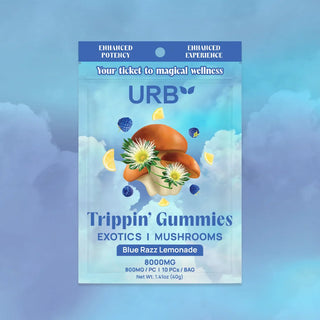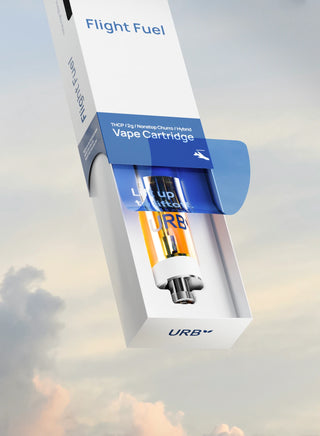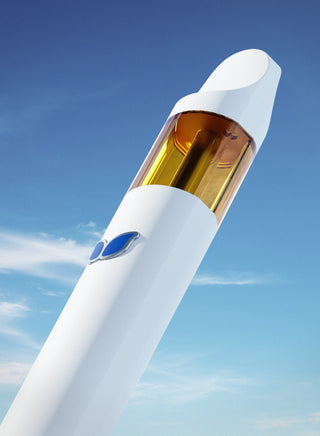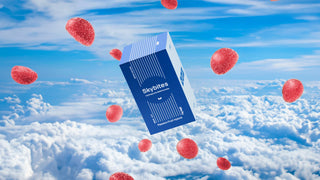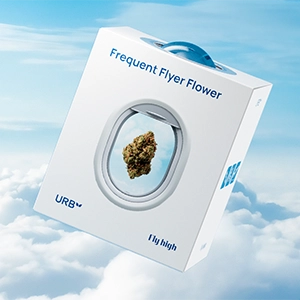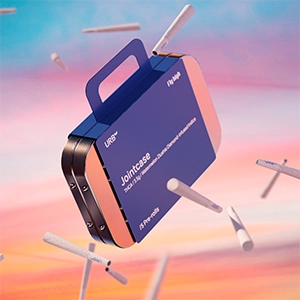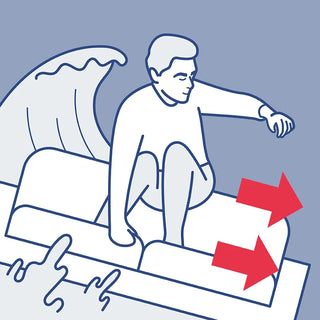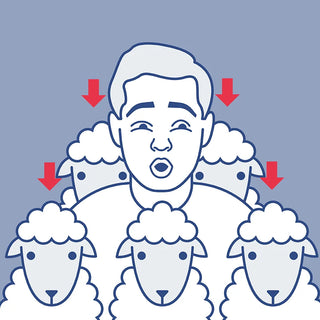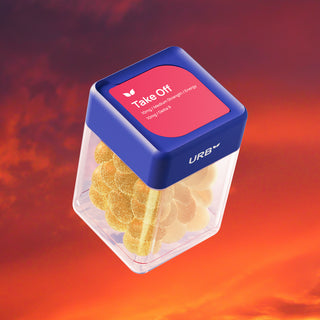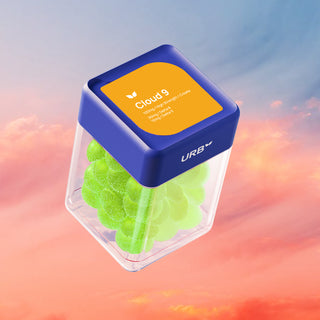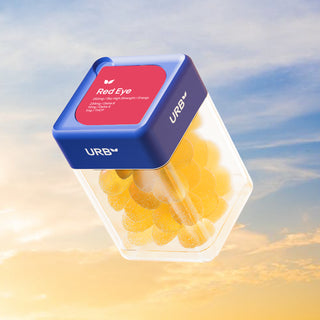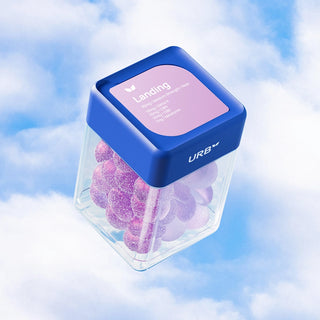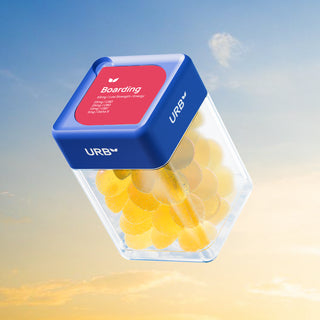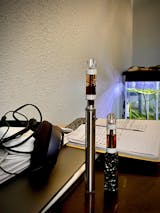What’s Up with THCV?
THCV might not be as well-known as THCP, Delta-9, or even Delta-10, but it’s been gaining momentum. Among the many cannabinoids in the cannabis plant, THCV—short for tetrahydrocannabivarin—stands out for its nuanced, sometimes contradictory behavior. While most cannabinoids deliver a fairly predictable effect curve, THCV breaks the mold. It's dose-dependent, short-acting, and often reported to promote a subtle sense of mental clarity.
Some consumers describe it as the functional cousin to THC. But others have heard it hyped as "diet weed," a term rooted in animal studies that are far from conclusive. This confusion makes it all the more important to cut through the noise.
What This Post Will Cover
Wondering what makes THCV different? We’ll cover key questions, including:
-
What is THCV and how does it differ from other cannabinoids?
-
What are THCV's effects and benefits?
-
Does THCV get you high?
-
How is THCV used in products like Urb’s Clarity Collection?
-
Is THCV legal under current hemp laws?
Let’s start with the basics.
What Is THCV?
THCV is a minor cannabinoid naturally found in trace amounts in certain cannabis and hemp strains. Sometimes mistaken in the lab for THC, the major intoxicating compound in cannabis, THCV was first identified by researchers in 1970.

It's chemically similar to THC but with one key structural difference: a three-carbon side chain instead of THC's five. This subtle shift means THCV interacts differently with CB1 receptors in the brain, which directly impacts its effects.
While most THCV is derived in the laboratory by processes such as isomerization, trace amounts occur in specific cannabis and hemp strains. While you can find small amounts of naturally occurring THCV in African landrace strains like Durban Poison, most of the THCV found in commercial products today come from hemp.
THCV Effects: What Does It Actually Do?
THCV is biphasic, meaning that its effects vary by dose. At low doses, it’s considered non-intoxicating and may even counteract some of the effects of THC. At higher doses, it may produce a mild, short-lived psychoactive experience.
According to one study published in 2023, test subjects only began to report feelings of intoxication when they were given doses between 100 mg - 200 mg. By way of comparison, many adults feel the psychoactive effects of THC beginning at doses of about 5mg, often even less.
What THCV does do is impart a short and energetic sense of clarity and focus—per some user reports. Effects tend to come on quickly and taper off just as fast. We include THCV in our line of effects-based products like in the Clarity Collection, where it adds a nice spark to Flight Fuel Clarity and Aerovape 710 Clarity. These products are designed to provide a grounded, elevating experience, not one that overwhelms.
THCV Benefits: Isn’t It Like THC—And That’s the Point
THCV isn't about intensity. It’s about refinement. Compared to most other cannabinoids, the effects of THCV come on quickly, but are typically more fleeting. Where THC might anchor you to the couch, THCV is more likely to get you up and moving—or at least keep your thoughts crisp while you go about your day.
THCV is subtle, its specialty is in sharpening or refining the effects of other cannabinoids and products targeted towards producing a grounded sense of focus and calm. For example, when used in tandem with Delta-8, HHC, or CBD, the blends may impart their own highly selective effects geared towards enhancing focus and productivity. Plus, since the THCV effects are generally shorter in duration, it can offer more control and predictability.
Is THCV Intoxicating?
Generally, no. Especially at the typical doses you’d encounter in vapes, edibles, and other standard formats, THCV may impart, at most, a very mild psychoactivity. When comparing THCV vs Delta 9 THC, any noticeable effects would be minimal at most.
Since THCV is biphasic, its effects are dose-dependent. W In studies where participants did report intoxication, it only occurred at high doses (100mg or more), and even then, the effects were described as mild compared to THC. This makes it an especially strong candidate for daytime use, when you might want to experiment with incorporating more subtle cannabinoids into your routine while staying clear, focused, and on top of your workload.
The“Diet Weed” Rumor: What’s Real and What’s Hype?
THCV earned the nickname "diet weed" based on early rodent studies. The most conclusive human-based research we have more recently was published in 2024. In the study, obese but otherwise healthy adults demonstrating early-stage symptoms of metabolic syndrome—a condition also known as insulin sensitivity or insulin resistance syndrome—were given a medication combining the cannabinoids THCV and CBD. The study concluded that using the medication was associated with statistically significant weight loss, decreases in abdominal girth, and other markers of improvement.
But it’s critical to stress: this is a very narrow, early-stage body of research. Urb does not promote THCV as a weight-loss tool, and there is currently no conclusive evidence to support those claims.
THCV vs Other Cannabinoids
How does THCV stack up against other cannabis and hemp compounds? Here’s a quick breakdown of each:
THCV vs THC
Compared with THC, THCV is only intoxicating at very high doses. Even then, test subjects describe those effects as being relatively mild. The onset of THCV’s effects are also relatively rapid and may burn off more quickly than what you would typically feel from THC.
THCV is also typically more energizing, unlike THC which may have a range of characteristics and qualities. What you’re likely to feel is a subtly clarifying effect on your mood that many find boosts their productivity and focus.
THCV vs Delta 9
Delta-9 THC is the dominant cannabinoid in traditional cannabis, though it can be derived from hemp. THCV is rare, milder, and usually exclusively derived from hemp.
THCV vs CBD and CBG
CBD and CBG are non-intoxicating and typically promote calm and relaxation. THCV is also non-intoxicating at standard doses but is more often associated with alertness, energy, and mental clarity.
THCV vs THCP
THCP is extremely potent, many times more than Delta-9. THCV, by contrast, is subtle. They sit on opposite ends of the psychoactive spectrum. Both are typically derived from hemp.
Is THCV Legal?
Yes. Under the 2018 Farm Bill, THCV that’s derived from hemp and contains 0.3% THC or less by weight is legal. However, some states have moved to ban or restrict the sale of hemp-derived cannabinoids. If in doubt, check your local laws and statutes to be sure that hemp-derived products are legal in your jurisdiction.

All Urb products containing THCV are lab-tested, compliant, and backed by certificates of analysis you can verify for yourself.
How to Try THCV
THCV comes in many of the same formats as your favorite cannabis products, including vapes, edibles, and tinctures. Due to its fast-acting, subtly energizing, and unique properties, it’s commonly found in cannabinoid blends rather than on it’s own.
At Urb, we use small amounts of THCV in our Clarity Collection, namely our Flight Fuel Clarity vape cartridge, featuring D10, D8, H4CBD, THCB, and THCV for a cool lift. And the sleek Aerovape 710 Clarity, leaning into D10, D8, H4CBD, THCB, and THCV to fuel subtle mental focus.
Both are crafted to support productivity, mood, and mental balance. Because THCV’s role in these blends is focused and calibrated, they’re perfect for daytime creativity or keeping your edge through busy schedules.
Final Take: Is THCV Right for You?
If you’re interested in trying select cannabinoids to lend gentle daytime support and clarity, THCV might be the right fit for you. Ideal for those seeking a subtle uplift and energy without getting overwhelmed, THCV has helped many shoppers soar above the storm clouds of distraction while staying on time and on their flight path.
Sound like your kind of destination? Explore more cannabinoid-rich blends designed for clarity at urb.shop.
